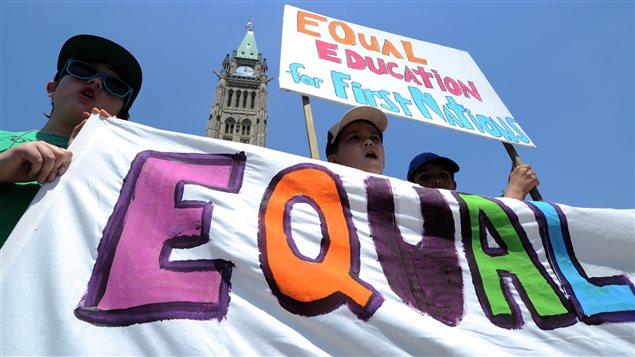The federal government discriminates against First Nation children living on reserves and in the northern Yukon Territory by providing less funding for children’s social services than elsewhere in Canada, the Canadian Human Rights Tribunal has ruled.
The ruling comes almost nine years after a complaint against Ottawa launched by the First Nations and Family Caring Society (FNFCS) and the Assembly of First Nations (AFN), a national advocacy organization representing First Nation citizens living in over 630 aboriginal communities.
They argued the support the federal government provides for child welfare on reserves and in the Yukon is much lower than the support provincial governments give to children off reserves – even though on-reserve needs are greater. Less funding for family support means more children end up in the child welfare system, they said.
In its decision published Tuesday morning, the Canadian Human Rights Tribunal agreed, saying the government’s “design, management and control of the First Nations Child and Family Services Program, along with its corresponding funding formulas and the other related provincial/territorial agreements have resulted in denials of services and created various adverse impacts for many First Nations children and families living on reserves.”
The decision also says the government must “cease the discriminatory practice and take measures to redress and prevent it.” It calls for the redesign of the child welfare system and its funding model, urging the use of experts to ensure First Nations are given culturally appropriate services.
An emotional Cindy Blackstock, executive director of the FNFCS, told reporters the decision was a “complete victory” for children everywhere, but she said she questions why the fight was ever necessary.
“Why did we have to bring the government of Canada to court to get them to treat First Nation children fairly? Little kids,” she said. “Why would it ever be OK to give a child less than other children?”
AFN National Chief Perry Bellegarde said he hopes to see an indication of the government’s willingness to work on the issue in the upcoming federal budget.
“We’ll be watching to ensure that that happens,” he said. “All of Canada will be watching.”
Government reaction
Carolyn Bennett, Minister of Indigenous and Northern Affairs, welcomed the decision, saying the matter never should have gone to tribunal in the first place.
“Today we are here to say we’re going to act on this issue and we will, as we have said in the platform and in our mandate letters, reform the system of child welfare and fund it equitably with the other children in Canada,” Bennett said.
Bennett said she plans to sit down immediately with other players, including the AFN, to figure out how big the funding gap is and how it can be remedied, but refused to elaborate on a price tag for the increased funding.
“One of the problems with this issue it’s been uneven across the country,” Bennett said. “So not only is the money insufficient, but it’s uneven across the country.”
Bennett said child welfare is a big priority for her government and it’s “hugely important that we get this right.”
“We have to start making sure that First Nations, Inuit and Metis children in this country get the same start in life as all other Canadian children,” Bennett said.
Looking at alternative models
Canada is looking at various aboriginal child service models, such as kinship care and customary care, pioneered in New Zealand, to make sure that First Nations children are not taken away from their families and culture, Bennett said.
“This is about real numbers on which I will be judged,” Bennett said. “Will we get more children out of foster care or into kinship and customary care? Will we get better social outcomes for children?”
The child welfare system for indigenous communities needs a complete overhaul, including removing financial incentives for breaking up families, Bennett said.
“There are many jurisdictions where you’re not allowed to remove a child for poverty,” Bennett said. “If there is no food in the fridge, you get some food in the fridge. If a child can’t be kept at home because there is no fire extinguisher in the house, we’ll get a fire extinguisher in the house not take the kid away.”
Justice Minister Jody Wilson-Raybould, a former Regional Chief of the British Columbia Assembly of First Nations, said the Liberal government is committed to building a nation-to-nation relationship with Canada’s indigenous peoples.
“At this time in our country’s history discrimination in any form is entirely unacceptable,” Wilson-Raybould said.
Time to for action
Dwight Dorey, National Chief of the Congress of Aboriginal Peoples, an advocacy group that represents Canada’s status and non-status Indians, Métis and Southern Inuit Aboriginal Peoples living off-reserves, said he’s “extremely happy” with the decision.
“It has been a long nine years for First Nations child welfare advocates who have waited patiently for the complaint to make its way through the justice system,” Dorey said in a statement. “Communities and welfare agencies that have struggled in the past, can hopefully now look forward to receiving adequate resources to help protect our children.”
UNICEF Canada’s President and CEO David Morley hailed the tribunal’s ruling as “historic,” saying it sets an important precedent “by promoting the right of Aboriginal children to be free from discrimination.”
“Today’s ruling, coming on the heels of the recent recommendations released by the Truth and Reconciliation Commission, represents a very important step towards healing the atrocities of the past and educating Canadians about the challenges faced by Aboriginal children, challenges perpetuated by a broken system that we can and must fix,” Morley said in a statement.
With files from CBC News







For reasons beyond our control, and for an undetermined period of time, our comment section is now closed. However, our social networks remain open to your contributions.